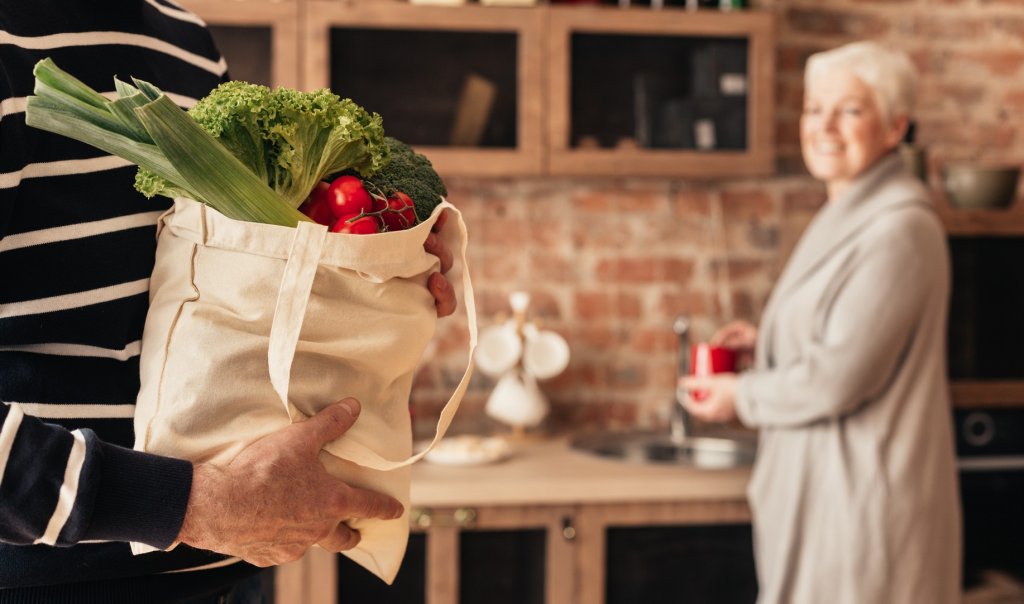Inside: Learn about surprising ways decluttering makes you healthier and how it can benefit your life!
A guest post by Melissa Waltz
You’ve probably thought about how decluttering can make it easier to clean your house or how donating your unused items can benefit others. But have you thought about the ways that decluttering can make you healthier?
Many of the health benefits of decluttering come from the way it makes you feel, both physically and mentally. And it’s not just about decluttering your stuff, but also about being more mindful about your diet and lifestyle, too.
Let’s take a look at how decluttering all areas of your life can benefit your overall health and wellbeing.

How Decluttering Benefits Your Health
Here’s how decluttering your lifestyle and living mindfully can improve your mental and physical health.
Decluttering Your Mind
The mind can become overwhelmed with clutter, leading to stress and anxiety. Living intentionally in your daily life is important for reducing mental clutter.
For example, when you get up in the morning, avoid checking the news or social media. Instead, allow your body to wake up slowly and simply enjoy the acts of preparing your morning coffee or breakfast.
According to experts at Rahav Wellness, daily meditation and yoga practice are also wonderful ways to reduce stress and mental clutter. Stress weakens the immune system and contributes to a variety of chronic health conditions, so finding ways to reduce it is key for overall health.
Decluttering Your Diet
Decluttering and mindfulness apply to the diet, as well. In fact, studies show that eating mindfully reduces overeating and promotes healthier eating on a daily basis.
One way to declutter your diet is to avoid mindless snacking. Instead, eat intentionally with the goal of nourishing your mind and body with a variety of clean, wholesome foods. Eat without distractions at regular mealtimes.
Sit down for your meals and chew each bite slowly, reflecting on the taste and smell of your food. This will improve your digestion and remind you to make healthier food choices.

Declutter Your Bedtime Routine
Your bedtime routine is another area that could benefit from decluttering. Much like removing clutter from your bedroom, establishing a consistent bedtime routine can help your mind settle down for the night so that you can fall asleep easier and sleep more soundly.
Start by limiting your screen time at least an hour before bedtime. Consider taking a warm bath to help you relax. Adding Epsom salts and essential oils is a great way to reduce aches and pains that may keep you awake or make it more difficult to fall asleep.
How Decluttering Your Stuff Makes You Healthier
So, how can decluttering your space benefit your health? Here are a few ways that decluttering makes you healthier.
Improved Sleep Quality
Even though your eyes are closed, and you can’t see the clutter all around you, your brain has a hard time shutting down when your space is a mess. If you’ve been having trouble sleeping lately, or you still feel tired when you wake up, it could be because there’s so much clutter in your home, especially in your bedroom.
Clutter is kind of like visual noise, distracting your brain and making it difficult to fall asleep. Decluttering your sleeping space makes it more relaxing so you can focus on calming your mind and getting a good night’s sleep.

Reduced Allergies
Clutter not only creates visual noise, but is also a haven for allergens like dust, mold, pet hair, and dander. Breathing in allergens can lead to health issues, especially over time.
In some cases, continued exposure to allergens can lead to breathing issues you didn’t have before or even cause illness directly.
Keeping a cleaner home improves the airflow in your home, making it feel less stuffy. Of course, it’s also easier to keep a clutter-free home allergen-free because it reduces the surface space for allergens to collect on.
Less Anxiety
Have ever wondered why humans are more at ease when things are organized and tidy? The answer lies in your brain.
The human brain works hard to make sense of our environment. The more neat and orderly things are in our environment, the easier it is for our brain to process.
Conversely, when you enter a space that’s messy and disorganized, your anxiety level increases. Anxiety is extremely common, and many people with this condition don’t realize how beneficial an orderly environment can be.
Keeping your space neat and tidy puts your mind at ease so you experience less anxiety on the day-to-day.

Lower Stress Levels
Much like anxiety, stress is quite common and many times it’s out of your control, such as on-the-job stress.
Constant clutter leaves you constantly thinking “I need to clean my house!” or “I don’t even know where to start with all this clutter!” That leads to additional stress that you can totally control!
In fact, research shows that clutter actually increases levels of the stress hormone, cortisol, and can even lead to depression over time. It’s also important to note that clutter affects everyone who lives in the home. This can lead to tension in the household as well, as additional stress for all.
As you declutter and organize your home, you’ll find that everyone’s stress level seems lower. Lowering stress is one of the best things you can do for the mental and physical health of your household.
Improved Productivity
That same visual noise that’s keeping you awake at night can also affect your productivity during the day, whether it’s at home or the office.
Clutter gets in the way of your brain’s ability to focus, which makes it harder to get things done. It’s just harder to get in the zone when you’re working if there’s a big mess all around you
And, in a time when working from home is becoming more and more common, keeping your home workspace tidy is especially important.
You’ll find that when your personal work area is organized, it’s easier to concentrate on work during work hours and easier to relax during your leisure time.

Increased Positivity
Everyone can benefit from having a more positive attitude, but a cluttered home can leave you feeling like life is out of control. If it really gets out of hand, you may begin to feel like the situation is hopeless.
The good news is, tackling the mess deliberately and methodically changes your way of thinking and gets you in a more positive mindset. That positivity will spill over into other areas of your life, too.
Decluttering Makes You Healthier by Helping You to Appreciate What You Have
It turns out that learning to appreciate what you have, rather than collecting more stuff, is actually good for your health. Developing an attitude of gratitude improves your moods and helps you sleep better, but the benefits go much further than that.
But even more interestingly, being thankful also reduces overall fatigue and inflammation related to heart health. Recognizing the positive things in your life improves your overall health and well-being.
Consider keeping a gratitude journal to remind you of all the things you have to be grateful for and bring yourself back into the present moment.
Decluttering not only benefits your home but also benefits your health. Let go of the excess and reap all of the rewards.

After pursuing her music career as a singer for an alternative rock band, Melissa began writing about the music industry. She is an independent writer who is continuously researching, learning, and exploring new areas in life. She now spends her days offering private music lessons and writing on various topics.
Sign up on the form below to get weekly tips on decluttering and simplifying sent to your inbox. You’ll also get the free 5 Areas to Declutter in 10 Minutes Checklist to help you start making progress right away!


I’m 73 and the clutter keeps increasing. When I try to cull I get decision fatigue which leads to anxiety and that sends me out to the yard where decisions are easy.
I wrote this post about decision fatigue and how to minimize it: https://www.thesimplicityhabit.com/what-is-decision-fatigue-minimize/. While decluttering does require making many decisions, it keeps you from continuing to have to make them over and over each day as you then have fewer options.